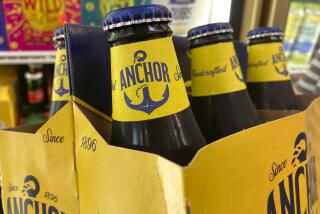Anheuser-Busch Now Brewing at Sea World : Beer: An arcane law has forced the giant to install a table-top brewery at the aquatic park. Plans call for a microbrewery and restaurant.
- Share via
St. Louis-based Anheuser-Busch, the nation’s largest brewer, has been forced to build a tabletop brewery at its Sea World aquatic park in San Diego in order to comply with an arcane, Prohibition-era state law.
Late last month, the tiny brewery, which is in a back room at the park on Mission Bay, produced a few gallons of beer under the watchful eye of a St. Louis-based brew master who is teaching a handful of Sea World employees how to make beer, said Joe Noelker, Anheuser-Busch’s St. Louis-based associate general counsel.
Anheuser-Busch, the nation’s largest brewer with 41% of the U.S. retail beer market, built the back-room brewery in order to comply with a “tied-house” law that state legislators adopted during Prohibition. The 1930s-era law generally prohibits alcoholic beverage sales by brewers and distillers unless the sales occur at retail outlets located at breweries and distilleries.
Anheuser-Busch ran afoul of the tied-house laws in late 1989 when it acquired Sea World parks in San Diego; Orlando, Fla.; Cleveland, and San Antonio, Tex., from Harcourt Brace Jovanovich. Even before the $1.1-billion acquisition was completed, Anheuser-Busch began negotiating with state regulators to ensure that the parks could continue to sell alcoholic beverages.
Regulators demanded that Anheuser-Busch, which brewed 79 million barrels of Budweiser, Michelob and Busch beer during 1989, meet the letter of the law by building a brewery, no matter how small.
So Anheuser-Busch, which operates a dozen massive breweries with individual capacities of up to 13 million barrels a year, last month established the tiny brewery that measures its output by the gallon. (A barrel of beer holds 31 gallons.)
Anheuser-Busch has not had to establish similar breweries in other states.
Ohio regulators ruled that the state’s tied-house rules did not apply to Anheuser-Busch because its beer and theme park operations are held by separate wholly owned subsidiaries. Florida regulators agreed to let Anheuser-Busch sell beer and other alcoholic beverages at the Orlando park until a proposed 5,000-barrel-a-year microbrewery and a restaurant begin operating in 1991. Texas passed legislation that allowed Anheuser-Busch to transfer the park’s alcoholic beverage sales operation to an independent company.
Since the tabletop brewery in San Diego will not produce beer for retail sale, most of the initial batch was discarded, Noelker said. However, Anheuser-Busch and Sea World employees tasted some of the brew, and a portion was shipped to corporate headquarters in St. Louis for testing.
Anheuser-Busch will keep the small brewery operating until a proposed 5,000-barrel-a-year microbrewery and restaurant are completed, Noelker said. That operation, which will be patterned after the one in Orlando, could be completed by 1992, Noelker said.
The Orlando and San Diego breweries will produce “an all-malt product line similar to what is produced by microbreweries” around the country, Noelker said. Anheuser-Busch hopes the brewery, which will conduct demonstrations for the public, will become yet another attraction at the park.
Beer brewed at the microbrewery will be sold in the accompanying restaurant, Noelker said. But Sea World will continue to sell competing brands at refreshment stands in all its parks, he said.
More to Read
Inside the business of entertainment
The Wide Shot brings you news, analysis and insights on everything from streaming wars to production — and what it all means for the future.
You may occasionally receive promotional content from the Los Angeles Times.










